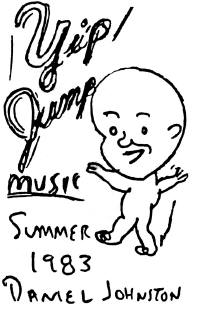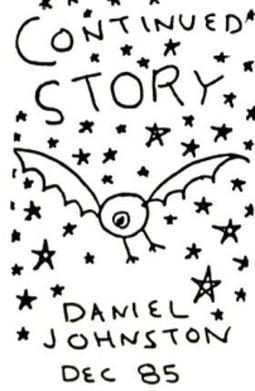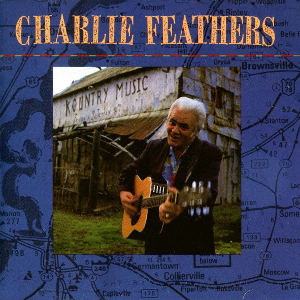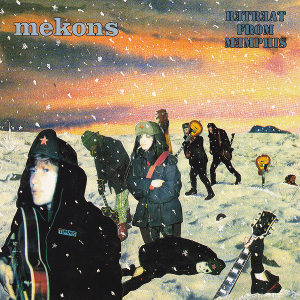
Songs of Pain is the first album by folk singer-songwriter Daniel Johnston, recorded on a simple tape recorder and released on Compact Cassette. Johnston recorded these songs in the basement of his parents' house in West Virginia. Johnston recorded the tape between 1980 and 1981, and it was later mass produced on cassette by Stress Records in 1988, and on Compact Disc in 2003 by the label Dual Tone, together with More Songs of Pain as Early Recordings Volume 1.

Don't Be Scared is singer-songwriter Daniel Johnston's second self-released album, released in 1982. It was re-released on cassette in 1989 by Stress Records, a label run by Johnston's friend and manager Jeff Tartakov, on mp3 by emusic.com in 2000, and on CDR by Eternal Yip Eye Music in 2004.

Yip/Jump Music is the fifth self-released music cassette album by singer-songwriter Daniel Johnston, recorded over the summer 1983. The album was re-released on cassette in 1986 by Stress records, and in 1988 released on CD and double LP by Homestead Records. The album has been re-released twice by Eternal Yip Eye Music: once in 2003 on CD and CD-R, and once in 2007 as a double vinyl LP.

Hi, How Are You: The Unfinished Album is the sixth self-released music cassette album by singer-songwriter Daniel Johnston, recorded in September 1983. The subtitle refers to the length of the album; Johnston had intended for it to be an hour-long release, as a majority of his earlier releases were.
"Walking the Cow" is a song written and recorded by singer-songwriter Daniel Johnston from his 1983 album Hi, How Are You. The title was inspired by an illustration on a wrapper for Blue Bell ice cream depicting a young girl attempting to lead a reluctant cow by its reins.
Glass Eye were an influential art rock group based in Austin, Texas, and were primarily active from 1983 to 1993. Popular in Austin, and on the college radio and tour circuit, the band's unusual and unique musical style, blending melodic hooks with dissonance and occasional tendencies for the avant-garde, delighted critics. Considered "one of Austin's most popular and influential bands", their commercial success never matched their critical acclaim. Through self-release, and being signed to Wrestler and Bar/None Records, they released four LPs, two EPs and one single, and when the band regrouped in 2006, they released their previously lost final LP, Every Woman's Fantasy, on their own label, Glass Eye Records.

1990 is the eleventh album by American singer-songwriter Daniel Johnston. It was released in January 1990, through record label Shimmy Disc. Like Continued Story before it, 1990 was intended to be Johnston's first studio album, but had to be completed using live recordings and home demos.

Fun is the second studio album by singer-songwriter Daniel Johnston, and his thirteenth album overall. It was his first major label release, as well as his only album for Atlantic Records. The album was produced by Butthole Surfers member Paul Leary. Two years after the release, Johnston was dropped from the Atlantic Records label.

This is a list of the discography of Daniel Johnston, who lived in Austin, Texas.

Retired Boxer is the seventh self-released music cassette album by singer-songwriter Daniel Johnston, recorded in 1984. The album's nine songs are performed in Johnston's usual confessional piano ballad style. This album, like those before it, was recorded with a consumer grade tape player. Evidence of this is found in the warbling tape hiss and distortion.

Continued Story is the ninth self-released album by Daniel Johnston, released on cassette tape in 1985. The album includes a cover of the Beatles song "I Saw Her Standing There". It was released on CD in 1991 by Homestead Records and re-released in 2003 on a dual-album CD, along with the 1983 album Hi, How Are You, by Johnston's own label, Eternal Yip Eye Music.

Merry Christmas is the tenth self-released music cassette album by singer-songwriter Daniel Johnston, recorded in 1988. The back of the cover features a typed message from Daniel: "Thanks to everyone who's helped in the past year, especially those who have bought and played my album. Thanks again."

The Bad Livers were an American band from Austin, Texas, United States, whose inventive musical style defied attempts to categorize them according to existing genres. Their influences included bluegrass, folk, punk, and other musical styles. The original lineup, formed in 1990, included Danny Barnes on banjo, guitar and resonator guitar, Mark Rubin on upright bass and tuba, and Ralph White III on fiddle and accordion. Barnes composed the majority of the group's original songs. When White left the group at the end of 1996, he was briefly replaced by Bob Grant on mandolin and guitar. Barnes and Rubin then continued to perform and record as a duo until unofficially dissolving the band in 2000. The band has neither toured nor recorded since then, but Barnes and Rubin have played a few live shows with Grant in 2008, 2009, and 2014.

Ralph E. White III is a musician from Austin, Texas who has drawn inspiration from traditional blues, old-time country, rock, African and Cajun music, among other traditions. He principally plays banjo, fiddle, accordion, guitar, kalimba and mbira. He was a founding member of the innovative and influential Austin trio the Bad Livers, formed in 1990 with banjoist and singer/songwriter Danny Barnes and bass and tuba player Mark Rubin. During the early 1990s, "White's sizzling dexterity on fiddle and accordion" was a "cornerstone of their buzz."

Kathy McCarty is an Austin, Texas-based musician and painter.

The Last Real Texas Blues Band Featuring Doug Sahm is an album by Doug Sahm released by Antone's Record Label in February 1995.

Charlie Feathers is an album by the American rockabilly musician Charlie Feathers, released in 1991. His final studio album, it was part of the Elektra/Nonesuch "American Explorer" series. It was Feathers's only album to be put out by a major label.

Adequate Desire is an album by the American musician Michael Hall, released in 1994. The album title comes from a line in an Emily Dickinson poem. Hall supported the album with a North American tour.

Retreat from Memphis is an album by English band the Mekons, released in 1994. It followed a few years of label troubles that saw the band considering a breakup. The band supported the album by touring with Man or Astroman?

Horses in the Mines is the second album by the American band Bad Livers, released in 1994. It was released a month after their gospel album, Dust on the Bible, was reissued. Horses in the Mines was Bad Livers' second album for Quarterstick Records; Bad Livers signed with Quarterstick, in part, because major labels considered the band to be a novelty. The band supported the album with a North American tour.














